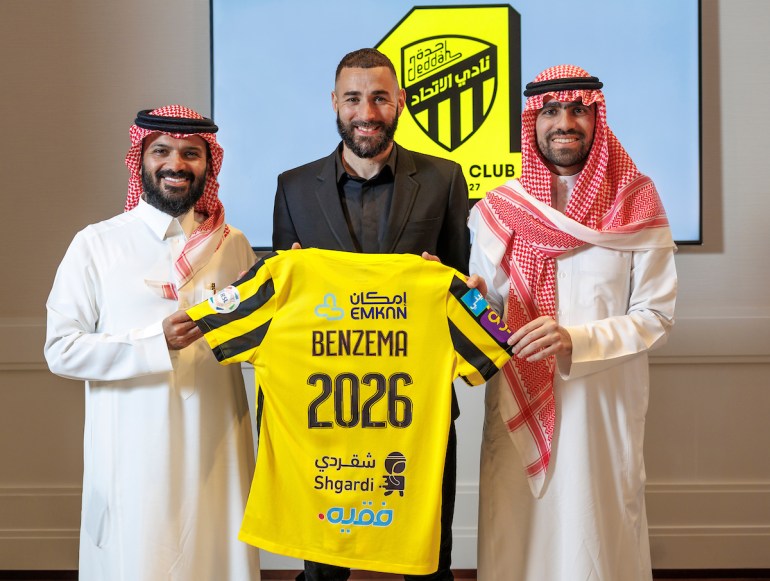Saudi Pro League kicks off after raiding Europe’s top football clubs
Saudi Pro League spent nearly half a billion dollars luring top players and coaches from traditional European powerhouses.
The Saudi Pro League kicks off on Friday following a year of high-profile transfers and amid criticism that Saudi Arabia’s lavish spending amounts to an attempt to shift the focus from its dire human rights record.
Clubs in the oil-rich Gulf state have lured global stars, with Karim Benzema, Jordan Henderson and Sadio Mane among those following in Cristiano Ronaldo’s footsteps.
Last month Al Hilal made a 300 million euro ($330m) bid for Kylian Mbappe, although the Paris Saint-Germain striker reportedly refused to meet with officials from the club.
The number of clubs has increased from 16 to 18 this season, with each allowed eight foreign players.
Al Ahli, in particular, are one of a few clubs that have benefitted from the Saudi Public Investment Fund’s (PIF) project to invest in and eventually privatise clubs, which also include reigning champions Al Ittihad, Al Hilal and Al Nassr.
On Friday, one could forgive Al Ahli fans for rubbing their eyes in disbelief when they see Champions League winners like Riyad Mahrez, Edouard Mendy and Roberto Firmino line up in their team’s shirt after the club’s return to the top flight.
“Saudi Arabia aspires to be like the English Premier League,” said Simon Chadwick, professor of Sport and Geopolitical Economy at Skema Business School in Paris.
“The media is paying attention,” he told the AFP news agency.
“I’m aware of people now asking the question: Where can I watch the Saudi Pro League?”
Just a few years after allowing its first non-Muslim tourists and letting women drive, Saudi Arabia is attempting to open up its conservative, long-cloistered society to the world.
The world’s biggest oil exporter has thrown hundreds of millions of dollars at sport deals including Ronaldo’s capture, Formula One in Jeddah and the lucrative LIV Golf tour, drawing frequent claims it is “sportswashing” its human rights record.
It is reportedly part of grand plans by the de facto ruler, Crown Prince Mohammed bin Salman, to modernise the Saudi economy and reduce its reliance on oil before the world moves on to other fuels.
Moqbel al-Zabni, editor-in-chief of the Saudi capital’s ar-Riyadiyah newspaper said that the kingdom wants “the compass of professional football to point to the Middle East and the Arab world”.
However, a Western diplomat in Riyadh told AFP on the condition of anonymity that the spending also helped deflect attention from human rights abuses.
“Most of the headlines are about Saudi attracting big players, not the long prison sentences handed down to activists,” they said.

‘Changed the market’
Ronaldo’s arrival in January to play for the Riyadh-based Al Nassr club is what first drew global attention to ongoing efforts to boost the Saudi Pro League.
The kingdom is offering eye-watering salaries that have lured celebrity players, rising stars and top coaches.
“I’ve worked in sport for 40 years and I’ve never seen a project as big, as ambitious and as determined to be a success,” Peter Hutton, who sits on the league’s board, told the BBC.
Manchester City manager Pep Guardiola said the Saudi league has “completely changed the market” and he expects more high-profile players to move there.
However, the kingdom still faces a series of challenges before it could rise to the helm of global football, said Egyptian sports journalist and TV host Amir Abd Elhalim.
“There are challenges at all levels,” he said, including respecting the contracts and entitlements of new players.
Last month, FIFA hit Al Nassr with a transfer ban, blocking the club from registering new players.
It was issued after Al Nassr failed to make a payment of 390,000 pounds ($469m) to Leicester City for the 2018 transfer of Nigeria striker Ahmed Musa.
Chadwick said that Saudi football is still “very much a work in progress”.
“We’re probably looking at the next five to 10 years before determining whether there is a long-term sustainable and fundamental change,” the expert added.


Add Comment